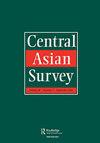Representation of the Kazakhstani famine (1931–33) in secondary school history textbooks, 1992–2021
IF 1.1
3区 社会学
Q2 AREA STUDIES
引用次数: 0
Abstract
ABSTRACT This paper studies the role of textbook authors when portraying the Kazakhstani famine of 1931–33 in textbooks printed between 1992 and 2021 for the secondary school subject ‘The History of Kazakhstan’. Drawing on a multilayered and inter-discursive analysis of seven of these textbooks, and after 10 interviews with curriculum developers and textbook authors, this paper argues that authorship agencies have reflected a level of ambivalence: on the cause(s) of the famine; on their evaluation of it as a tragedy or as a genocide; on the identification of the perpetrators and victims; and the people’s revolt against the collectivization. The textbook authors have echoed the narratives from the cautious approach to the famine’s commemoration portrayed in state-led nation-building, to those in Kazakh nationalist narratives and the academic history. The results of this paper oppose the general assumption that textbook narratives are merely constructed from ‘above’ in a non-democratic state such as Kazakhstan.哈萨克斯坦饥荒(1931-33)在中学历史教科书中的表现,1992-2021
摘要本文研究了教科书作者在1992年至2021年出版的中学“哈萨克斯坦历史”教科书中描述1931-33年哈萨克斯坦饥荒时所扮演的角色。本文对其中七本教科书进行了多层次、跨话语的分析,并在对课程开发人员和教科书作者进行了10次采访后,认为作者机构反映了一定程度的矛盾心理:饥荒的原因;他们将其评价为一场悲剧或种族灭绝;查明肇事者和受害者;以及人民对集体化的反抗。教科书作者呼应了从国家领导的国家建设中对饥荒纪念的谨慎态度,到哈萨克斯坦民族主义叙事和学术史中的叙事。本文的结果反对了这样一种普遍的假设,即在哈萨克斯坦这样的非民主国家,教科书叙事只是从“上面”构建的。
本文章由计算机程序翻译,如有差异,请以英文原文为准。
求助全文
约1分钟内获得全文
求助全文

 求助内容:
求助内容: 应助结果提醒方式:
应助结果提醒方式:


